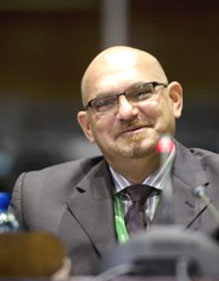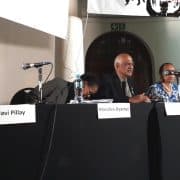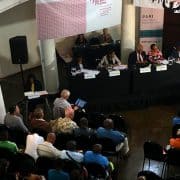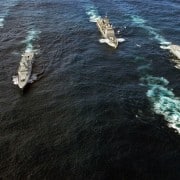|
Getting your Trinity Audio player ready...
|
 By Lee-Ann Alfreds
By Lee-Ann Alfreds
Chippy Shaik, the former Department of Defence chief of acquisitions whom arms critics believe was central to the subversion and manipulation of South Africa’s controversial 1999 arms deal, has denied any wrongdoing.
Testifying at the Arms Procurement Commission last week, Shaik insisted he had not:
*acted inappropriately to ensure his fraudster brother, Schabir, benefited from the arms deal;
* solicited a bribe of $3-million nor
* manipulated scores to ensure any particular bidder triumphed.
"I maintain that I acted appropriately and within my acquisition mandate at the time," he told the commission which is investigating allegations of wide-scale fraud and corruption in the deal.
In two days on the stand, Shaik – who indicated that he had travelled from Perth in Australia to vindicate himself in the court of public opinion – testified that he had in no way manipulated the scoring system used in the procurement process to ensure certain bidders were successful.
“[It was] a pure mechanical exercise of adding scores, scores being written down on the board. It was written on a board in the room and those numbers then were added up. So there was no room for manipulation of the numbers by any committee member for any project team. No project team knew the score of the previous project team and vice versa and no member could influence any individual score per category,” he testified. Authors Paul Holden and Hennie van Vuuren had accused him of amending scores in their book Devil in the Detail: How the Arms Deal Changed Everything.
Dealing with concerns about tenders being awarded despite no figures being considered, Shaik testified the reference to a “non-costed option” with regards to the purchasing of the planes for the Air Force was not sinister. He said it was the air force’s decision to present a costed and non-costed option.
He said the air force preferred the more expensive Hawks – which were eventually purchased – to the more cost-effective MB-339s because the Hawk offered ”a dual role aircraft, both pilot training and a limited operational use capability” to the MB-339 which “offered only a pilot training capability at lower cost”.
He added that the defence department did not tell the air force how to achieve its standard of effectiveness. “We accepted their number,” he testified.
Shaik also addressed the issue that South Africa could not afford the cost of the deal, indicating the Department of Defence was aware there would be a “shortfall” in its budget if it acquired the package it finally opted for. He said the department had openly told Cabinet, in a meeting, that the shortfall would amount to R9.7-billion over 17 years.
He confirmed that the amount of R29.8-billion, which Cabinet in 1999 noted as the cost of the deal, excluded financing costs. Critics estimate the deal actually cost South Africa R71-billion.
Allegations of nepotism and conflict of interest
Referring to allegations that he insisted French arms manufacturer Thomson award his brother Schabir’s African Defence Systems (ADS) a R400-million tender, Shaik categorically denied it. Insisting that “I at no time selected or deselected any supplier or sub supplier … that selection or deselection process as spelt out, is not correct as reflected in the public media”, Shaik testified the decision on subcontracts was the decision of “the prime supplier of equipment”.
However, according to the State in its successful fraud trial against Schabir Shaik, Thomson was informed by Chippy that it needed to resolve the situation with his brother to his brother’s convenience; failure to do so, he is alleged to have noted, would mean that he would “make things difficult” for Thomson, the media reported at the time. Schabir Shaik was convicted in 2005 on two charges of corruption, one of which was soliciting a bribe from Thomson for President Jacob Zuma, and sentenced to 15 years in jail.
Dealing with the allegations that he did not recuse himself when the issue of ADS was being discussed, Shaik went on the offensive, insisting it was interesting that despite there being 500 to 1 000 sub suppliers, there was only an allegation “continuously coming from one”. He said Richard Young’s CCII which lost out to ADS to supply the combat suite for the corvettes, did not want to issue a performance guarantee which was required.
“The DOD and the German frigate consortium considered the local business [CCII] to be of high risk. So it was about the only programme that was raised to a cabinet subcommittee level, because the local supplier was intimidating everyone in saying that there are issues of improper conduct.
“This had more to do with the guarantee that was required … It is stated clearly in the documents that the main contractor is responsible for the entire risk associated with it. So this was an issue of risk. It became a bit messy on the issue or proper recusal, non-recusal etcetera, other than to say that I have no conflict of interest. I have no interest or shares in any company.
“So I could have no conflict,” he testified.
He also insisted his brother Schabir’s Nkobi Holdings was “not involved” in the arms deal in any manner. “They only became indirectly involved after Thomson France decided to bring its equity from France into Thomson South Africa. So that was just before the contracts were signed but long after a preferred bidder was discussed, and long after the conclusion of the combat suite has taken place.“
But he said he did “indicate that potential bias to the committee members”.
Getting involved in the submarine tender
Shaik admitted two instances of “moderating”: mediating in the German submarine consortium – which eventually won – and in the corvette contract.
He said he mediated, along with the Department of Trade and Industry, in the submarine tender because of a “power play” between the defence industrial participation (DIP) and national industrial participation teams.
The other instance of moderating involved the corvette contract. “Again this was a sort of a dispute between the technical team and the DIP team. The technical team stipulated in their main contract that the main contractor should not specify what parties they are going to use in the combat suite. That will be in the negotiating phase. Whereas the DIP team wanted specific business plans … So we advised them to do it under camera to ensure that no one can then claim irregularity.
“So that is the high level moderating but there was not moderating in terms of playing around with results and playing around with numbers. That is not the moderation that we did.”
Dismissive of critics
Referring to books alleging he had manipulated and subverted the process, Shaik said: “None of these allegations have been proven in front of this commission. None of these authors have come to the commission to prove their allegations. They tend to make these allegations in the public domain.” Holden, Van Vuuren and fellow author and former ANC MP Andrew Feinstein withdrew from the commission in August.
Shaik also rubbished claims by arms activist Terry Crawford-Browne – whose court action led to the establishment of the commission – that he had admitted to Parliament’s joint standing committee on defence in early 1998 that South Africa could not afford the equipment.
“That is not possible because …no decision to acquire, no idea of what the cost would be could have come out in early 1998. It is not possible at all for me to make a comment. I was not even the chief of acquisition at that time.”
He also denied ever apologising for wasting Parliament’s time, effort and public money on the arms deal as claimed by Crawford-Browne in his book Eye on the Money.
“These are equipment for the Department of Defence so I cannot apologise for the requirement of the Department of Defence. So, no, I did not make an apology.”
No money changed hands
Regarding soliciting a $3-million bribe from ThyssenKrupp, Shaik said: “I solicited no such offer nor did I receive no such money as described in these various allegations.” Holden, Van Vuuren and Feinstein have all detailed in books how a German investigation uncovered Chippy Shaik was the recipient of such a bribe.
In their book, Holden and Van Vuuren noted a memo from a ThyssenKrupp executive which read: “During one of our meetings he (Chippy Shaik) asked once again for explicit confirmation that the verbal agreement made with him for payment to be made in case of success, to him and a group represented by him, in the amount of 3 million US$. I confirmed this to him.
“Mr Shaik has emphasized that the B+V/TRT offer was pulled into first place in spite of the Spanish offer being 20% cheaper. The Spanish offset was according to him also valued higher than ours. In this respect it had, according to him, been no simple exercise to get us into 1st place.”








